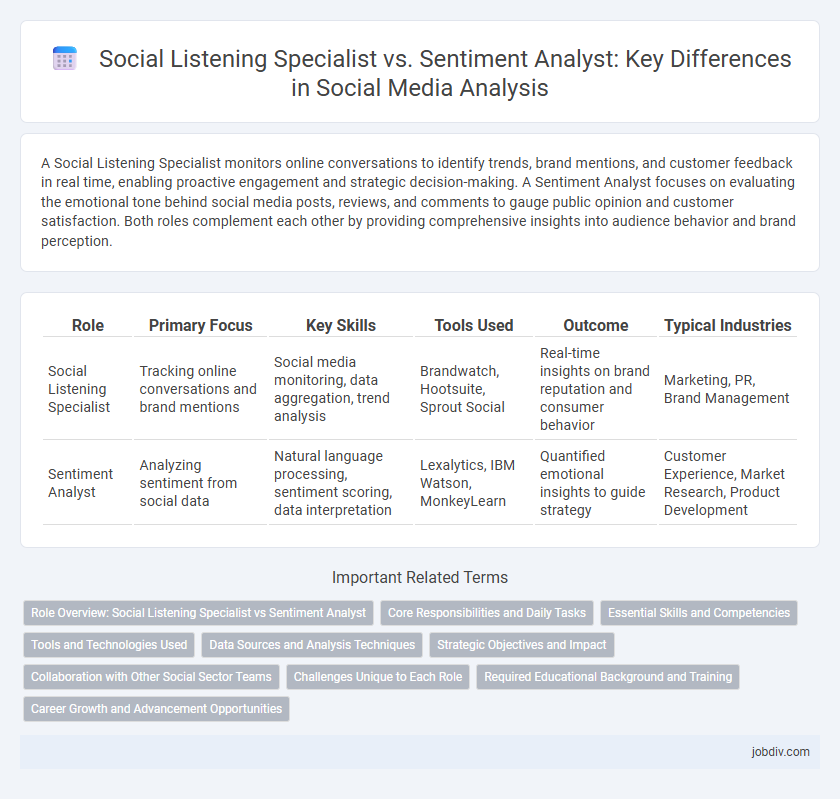A Social Listening Specialist monitors online conversations to identify trends, brand mentions, and customer feedback in real time, enabling proactive engagement and strategic decision-making. A Sentiment Analyst focuses on evaluating the emotional tone behind social media posts, reviews, and comments to gauge public opinion and customer satisfaction. Both roles complement each other by providing comprehensive insights into audience behavior and brand perception.
Table of Comparison
| Role | Primary Focus | Key Skills | Tools Used | Outcome | Typical Industries |
|---|---|---|---|---|---|
| Social Listening Specialist | Tracking online conversations and brand mentions | Social media monitoring, data aggregation, trend analysis | Brandwatch, Hootsuite, Sprout Social | Real-time insights on brand reputation and consumer behavior | Marketing, PR, Brand Management |
| Sentiment Analyst | Analyzing sentiment from social data | Natural language processing, sentiment scoring, data interpretation | Lexalytics, IBM Watson, MonkeyLearn | Quantified emotional insights to guide strategy | Customer Experience, Market Research, Product Development |
Role Overview: Social Listening Specialist vs Sentiment Analyst
A Social Listening Specialist monitors and analyzes online conversations to identify brand perception, emerging trends, and customer feedback across multiple social media platforms. A Sentiment Analyst focuses specifically on interpreting emotional tones and attitudes in social data to measure public sentiment and inform marketing strategies. Both roles utilize advanced analytics tools but differ in scope, with Social Listening Specialists providing broader context and Sentiment Analysts delivering detailed emotional insights.
Core Responsibilities and Daily Tasks
Social Listening Specialists monitor brand mentions and conversations across social media platforms to identify trends, emerging issues, and customer feedback in real time. Sentiment Analysts focus on interpreting the emotional tone behind the data, categorizing customer opinions as positive, negative, or neutral to gauge public perception. Both roles collaborate to provide actionable insights for marketing strategies, yet Social Listening Specialists prioritize data collection and trend identification, while Sentiment Analysts emphasize emotional analysis and reporting.
Essential Skills and Competencies
A Social Listening Specialist excels in monitoring brand mentions, tracking trends, and analyzing competitor activities using advanced social media tools and data analytics platforms. A Sentiment Analyst specializes in interpreting emotional tone and customer attitudes by leveraging natural language processing (NLP) and text mining techniques to assess public sentiment accurately. Both roles require strong analytical skills, attention to detail, and expertise in data visualization software to translate insights into actionable business strategies.
Tools and Technologies Used
Social Listening Specialists utilize advanced tools like Brandwatch, Talkwalker, and Sprinklr to monitor brand mentions, track social trends, and analyze audience behaviors across multiple platforms. Sentiment Analysts focus on technologies such as natural language processing (NLP) algorithms, IBM Watson, and Lexalytics to interpret emotional tones and categorize consumer opinions with high accuracy. Both roles leverage AI-driven dashboards and API integrations to enhance data visualization and real-time reporting for strategic decision-making.
Data Sources and Analysis Techniques
Social Listening Specialists leverage diverse data sources including social media platforms, online forums, blogs, and news sites to gather real-time public conversations, utilizing natural language processing and keyword tracking to identify trends and brand mentions. Sentiment Analysts focus on analyzing the emotional tone within this data, employing machine learning algorithms and sentiment scoring models to gauge public opinion and customer feelings toward products or services. Both roles rely on advanced analytics tools but differ in scope: Social Listening Specialists emphasize broad data collection and trend identification, while Sentiment Analysts concentrate on interpreting sentiment and emotional nuances from the collected data.
Strategic Objectives and Impact
A Social Listening Specialist gathers real-time consumer insights by monitoring brand mentions and trends across social media platforms, enabling proactive strategy adjustments to enhance customer engagement. A Sentiment Analyst interprets emotional tones and public opinions through advanced data analysis, driving informed decisions that refine brand messaging and reputation management. Both roles contribute strategically by transforming social data into actionable intelligence, significantly impacting marketing effectiveness and competitive positioning.
Collaboration with Other Social Sector Teams
Social Listening Specialists collaborate closely with content creators, community managers, and marketing teams to extract real-time audience insights and adapt social strategies effectively. Sentiment Analysts work alongside data scientists and customer experience teams to interpret emotional tones in social data, enhancing targeted communication and brand perception. Both roles ensure seamless integration of qualitative and quantitative data, driving informed decisions and cohesive cross-functional social initiatives.
Challenges Unique to Each Role
Social Listening Specialists face challenges in sifting through vast amounts of unstructured data across diverse platforms to identify relevant trends and emerging conversations. Sentiment Analysts struggle with accurately interpreting the nuanced emotions and context within user-generated content, often contending with sarcasm, irony, and cultural differences. Both roles require advanced analytical tools and strategies, but Social Listening Specialists prioritize breadth and volume, while Sentiment Analysts emphasize depth and emotional accuracy.
Required Educational Background and Training
A Social Listening Specialist typically requires a background in marketing, communications, or data analytics, with training focused on social media monitoring tools and consumer behavior analysis. Sentiment Analysts often hold degrees in linguistics, psychology, or computer science, emphasizing natural language processing, sentiment classification, and machine learning. Both roles benefit from expertise in data interpretation and software such as Brandwatch or Clarabridge, but Sentiment Analysts possess deeper skills in computational linguistics and algorithm development.
Career Growth and Advancement Opportunities
Social Listening Specialists leverage real-time data analytics to monitor brand mentions across platforms, offering immediate insights critical for proactive reputation management. Sentiment Analysts deepen this approach by interpreting complex emotional tones in large datasets, providing strategic guidance that influences long-term brand positioning and customer engagement. Career growth for Social Listening Specialists often leads to roles in digital marketing or community management, while Sentiment Analysts frequently advance into data science leadership or strategic consulting due to their specialized analytical expertise.
Social Listening Specialist vs Sentiment Analyst Infographic

 jobdiv.com
jobdiv.com